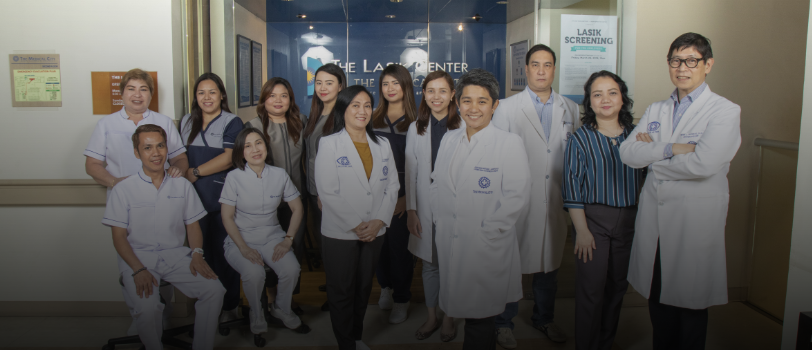Eye and Vision Institute
2nd Floor Podium Bldg.
Monday to Friday 8:00 AM – 5:00 PM
Saturday 8:00 AM – 12:00 NN
Eye Center Reception – (632) 988-1000 / (632) 988-7000 local 6252
Eye and Vision Institute Clinic – (632) 988-1000 / (632) 988-7000 local 6253
The Eye and Vision Institute seamlessly integrates a spectrum of specialized services, including the comprehensive Eye Center and The LASIK Center. This collaborative approach ensures that patients receive cutting-edge eye care and vision correction, all under one eye and vision center.
The Eye and Vision Institute's commitment to creating a holistic eye care center is demonstrated by its offering of state-of-the-art diagnostic procedures and treatments, all delivered by a dedicated team of ophthalmological experts who prioritize your eye health and visual well-being.
Eye Center
Cataract Surgery Screening
The Medical City’s eye care center offers comprehensive assessments and advanced laser treatment for cataracts, restoring clear vision.
Retina Diagnostic Tests
The team conducts evaluations to diagnose and effectively manage retinal conditions, with a goal of preserving eyesight and ensuring optimal visual health.
Retina Treatment Modalities
The clinic offers cutting-edge therapies that are customized to cater to each patient's specific needs, ultimately promoting optimal retinal health and vision.
Glaucoma Diagnostics
Advanced tests are utilized to detect glaucoma, and if diagnosed, laser treatment is employed to effectively manage intraocular pressure and safeguard optic nerve health.
Special Packaged Procedures
The Medical City’s eye and vision center provides carefully tailored bundles of treatments and services, designed to ensure efficient and cost-effective care for our patients.
Miscellaneous Diagnostics
The Medical City’s eye care center offers specialized diagnostic services, all designed to effectively address a multitude of eye health concerns, ensuring comprehensive and accurate assessments.
The LASIK Center

Eye and Vision Institute Flagship Programs
The center specializes in the diagnosis and treatment of all refractive errors, including myopia (near-sightedness), hyperopia (far-sightedness), astigmatism and presbyopia mainly, by using a specialized laser surgery called LASIK.
learn moreWhat are the Common Eye Conditions to Get Checked?
Common conditions to get checked include cataracts, glaucoma, macular degeneration, diabetic retinopathy, and refractive errors like myopia or hyperopia.
What are the Risk Factors for Eye Issues?
Risk factors for eye issues encompass age, family history, diabetes, high blood pressure, smoking, UV exposure, and a sedentary lifestyle.
When Do You Need to Get Your Eyes Checked?
Regular eye checkups are recommended at least once every two years for adults under 60, and annually for those over 60 or with specific eye conditions. However, consult an eye care professional for personalized recommendations.
Are Eye Exams Painful or Uncomfortable?
No, eye exams are generally painless and non-invasive. The eye care professional may use eye drops to dilate your pupils, which can cause temporary blurred vision and light sensitivity.
What Should I Bring to My Eye Exam?
Bring your current eyeglasses or contact lenses, a list of medications, and information about your medical history and any eye-related symptoms to your chosen eye care center.
Can Children Get Regular Eye Checkups?
Yes, regular eye checkups for children are important to detect vision problems early. Pediatric eye exams can identify issues that may affect learning and development.
Do I Need an Eye Exam If I Don't Have Vision Problems?
Yes, regular eye exams can detect eye conditions and diseases before symptoms appear. They are essential for maintaining overall eye health.
What are the Signs of an Eye Emergency?
Signs include sudden vision loss, severe eye pain, eye injuries, sudden double vision, flashes of light, or a curtain-like shadow over your vision. Seek immediate medical attention from an eye and vision center if you experience any of these symptoms.
